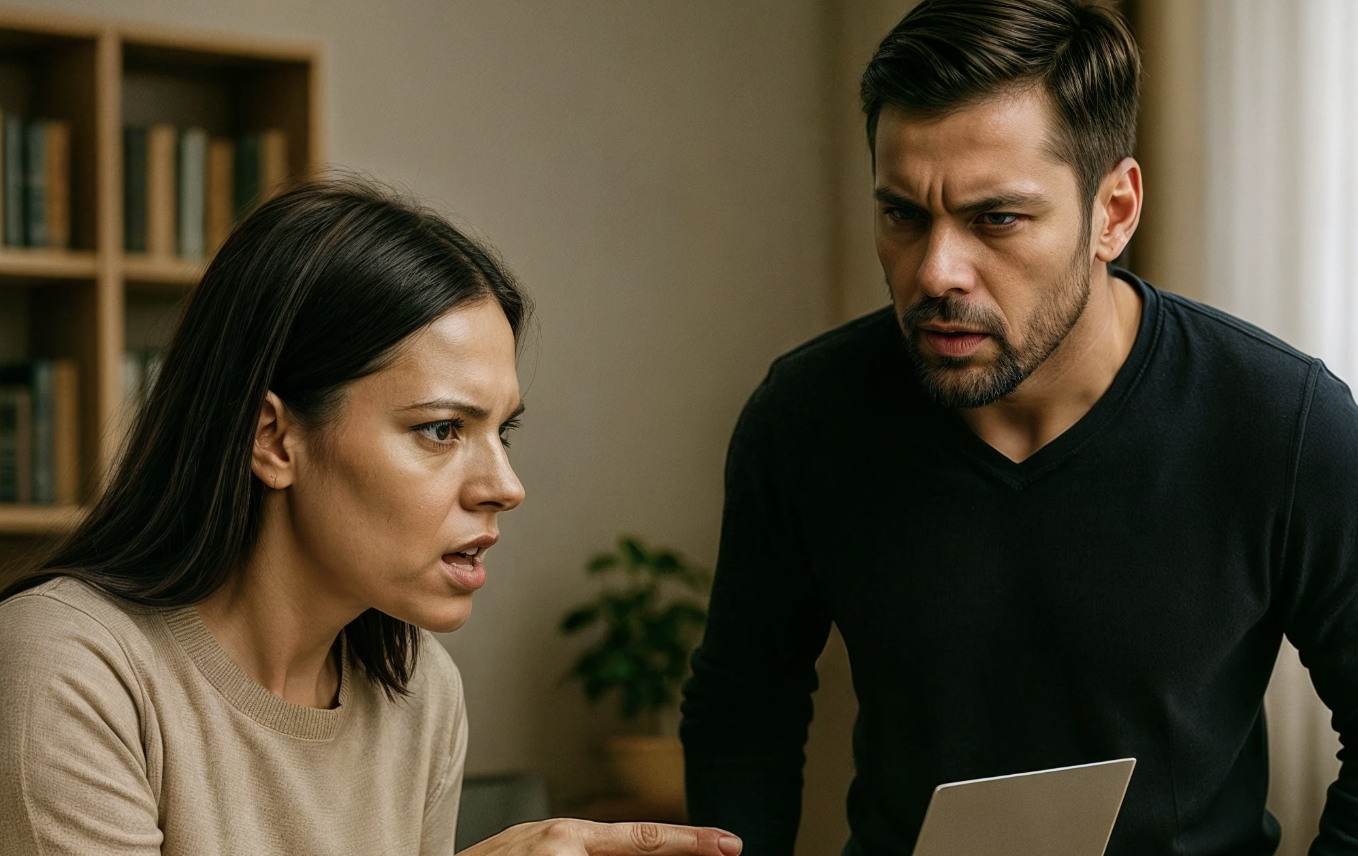Nina stood by the window, watching children play in the yard. The apartment had been inherited from her grandmother three years ago, and after the wedding, her husband Sergey moved in with her. A spacious three-room flat in an old building, with high ceilings, parquet floors creaking underfoot — just like in childhood. Only now it was just the two of them living there, though sometimes it hardly felt like they were living together at all.
“Nina, we’re here!” came a familiar voice from the hallway. Keys jingled, the door slammed shut. Sergey had given the keys to his mother in the very first month of their life together. For convenience, he had explained then.
Lidiya Nikolaevna entered the living room carrying a bag of groceries. Right behind her came Inna, Sergey’s sister-in-law, with the typical expression of someone who didn’t come just to visit.
“How are you, dear?” the mother-in-law said, placing the bag on the table and looking around. “Oh my, there’s dust on the dresser. And the flowers have completely wilted.”
“Good afternoon, Lidiya Nikolaevna,” Nina wiped her hands with a towel. “I was just about to clean up.”
“You weren’t about to, you should have already cleaned,” Inna snorted as she passed into the kitchen. “Sergey’s always at work, and here’s a mess at home.”
Nina felt that familiar irritation rising somewhere in her chest. Every visit started the same way: a scrutinizing look, remarks, advice. As if the apartment didn’t belong to Nina but to the whole family.
“I’ll go to the bedroom and make the bed,” Lidiya Nikolaevna said, heading to the room without waiting for an answer. “I bet it’s messy there too.”
“I already made the bed,” Nina tried to stop her mother-in-law, but she had already disappeared behind the door.
Meanwhile, Inna opened the fridge and began inspecting its contents.
“The milk’s sour,” the sister-in-law announced. “And the bread’s stale. How does Sergey even eat like this?”
Nina pressed her lips together. She had bought the milk yesterday, and the bread was fresh too. But arguing was useless. The relatives always found something to criticize.
Sounds of moving furniture came from the bedroom. Lidiya Nikolaevna was rearranging something, fixing something. Nina knew that in half an hour, the room would look different from the way it was in the morning. The mother-in-law had her own idea of how things should be arranged.
“Lidiya Nikolaevna, there’s no need to touch anything there,” Nina shouted, but there was no answer.
“Mom knows better,” Inna shrugged. “She has experience. And you’re still young, you don’t understand much.”
Thirty-three years old — young. Nina smiled to herself. She had married at thirty and considered herself a fully grown woman. But in the eyes of her husband’s relatives, she remained an inexperienced girl who needed constant guidance.
“Nina, where are your dust cloths?” came the voice from the bedroom. “And furniture polish?”
“In the bathroom, on the shelf,” Nina answered, feeling the tension in her shoulders increase.
The relatives stayed for two hours. Lidiya Nikolaevna rearranged half the furniture in the bedroom; Inna washed all the dishes and rearranged the groceries in the fridge according to her own preferences. When the door finally closed behind them, Nina felt relief.
In the evening, getting ready for bed, Nina opened the jewelry box on the vanity. The grandmother’s chain that had always lain in the left corner was gone. Nina sifted through the contents several times, looked under the lid, checked all compartments. The chain was nowhere to be found.
“Sergey, have you seen my gold chain?” Nina asked when her husband came out of the shower.
“What chain?” Sergey was drying his hair with a towel.
“The grandmother’s. It was always in the jewelry box.”
“Haven’t seen it. You probably put it somewhere and forgot. Your memory lately…” Sergey waved his hand and went to bed.
Nina searched the vanity again, checked the dresser drawers, looked in the bedside table. The chain seemed to have vanished into thin air. But things don’t disappear by themselves. Someone took it.
The next day, Nina searched the entire apartment. She looked under the furniture, rummaged through the bedding, checked the pockets of clothes. The chain was nowhere. And just the morning before, getting ready for work, she had definitely seen the gold in the box.
A week later, earrings disappeared. Small gold studs with purple stones — a birthday gift from her husband. Nina remembered clearly: she had put the earrings in the box last night, and in the morning, they were gone.
“Lost something again?” Sergey irritatedly looked up from his phone as his wife searched the bedside table for the third time.
“The earrings are gone. The ones you gave me.”
“Maybe you dropped them somewhere? Did you check the bathroom?”
“Checked everywhere.”
“Well, what now? Are you going to turn the whole apartment upside down?”
Nina felt her cheeks burn with offense. Her husband spoke as if losing jewelry was a whim, not a real problem.
That weekend, the relatives came again. Lidiya Nikolaevna brought homemade cutlets, Inna — a store-bought cake. While Nina set the table, the mother-in-law and sister-in-law went to the bedroom.
“We’ll straighten the bed,” Lidiya Nikolaevna explained. “And dust at the same time.”
Nina wanted to say she had dusted in the morning, but stayed silent. It was useless. Relatives would find a reason to rummage through things anyway.
At the table, the conversation turned to the missing jewelry.
“You probably dropped it somewhere,” Lidiya Nikolaevna said sympathetically, shaking her head. “Memory starts to fail at your age.”
“I’m thirty-three,” Nina reminded her.
“So what if you’re thirty-three? My friend got sclerosis at thirty-five. Stress, environment, bad diet…”
“Maybe the cleaning lady took it?” Inna suggested. “You have a woman coming to clean.”
“The cleaning lady hasn’t come for a month,” Nina replied. “And the jewelry disappeared recently.”
“Then you lost it yourself,” the sister-in-law shrugged. “Who knows. Maybe there was a hole in your bag, and it fell out.”
The conversation moved on to other topics, but the feeling remained. Nina felt something was wrong. Jewelry can’t just disappear. And the relatives took the loss too calmly. As if they knew exactly what to look for and where.
After the guests left, Nina sat in the kitchen for a long time, drinking tea and thinking. Maybe it really was her memory? Maybe she dropped it somewhere? But an inner feeling told her: it’s not about memory.
The next day, Nina went to an electronics store. The salesman showed her several models of hidden cameras. Small, inconspicuous, with motion sensors.
“What do you need it for?” the consultant asked.
“For security,” Nina answered briefly.
At home, she installed the camera in the bedroom, behind a photo frame on the dresser. The device was coin-sized, practically invisible. If someone was really stealing jewelry, now it would be caught on tape.
For three weeks, the camera recorded only ordinary life: Nina cleaning, Sergey getting ready for work, going to bed. No suspicious moments. Nina began to think she had wasted her money.
And then the relatives came again.
“Borscht’s here,” announced Lidiya Nikolaevna, entering with a pot. “Fresh, just cooked.”
“Thanks,” Nina took the pot and carried it to the kitchen.
“We’ll tidy up the bedroom meanwhile,” said the mother-in-law, heading into the room with Inna.
Nina washed dishes and listened to sounds from the bedroom. Closet doors opening, drawers sliding out, rustling. Normal cleaning sounds. After half an hour, the relatives left, wishing a good evening.
In the morning, Nina checked the jewelry box. The grandmother’s wedding ring, which had always been in a separate little box, was gone. A simple gold ring, no stones, but very dear to her heart. Nina sometimes wore it on her pinky when she especially missed her grandmother.
Her hands trembled as she turned on the camera and started reviewing the footage. The first shots showed an empty room. Then Lidiya Nikolaevna entered the frame. The mother-in-law approached the vanity, opened the jewelry box, rummaged through the jewelry for a long time. Took the ring, twirled it in her hands, examined it closely. Then slipped it into her coat pocket.
Inna stood nearby, silently watching. The sister-in-law neither expressed surprise nor indignation, nor tried to stop her mother. She just stood calmly, watching as the other hid someone else’s ring.
Nina watched the recording several times, refusing to believe what she saw. But there was no doubt: the mother-in-law took the ring, and the sister-in-law was an accomplice.
Her heart pounded wildly. So, the jewelry wasn’t lost. So, her memory wasn’t failing. So month after month, the relatives had been coming to the house and stealing. Under the guise of care and cleaning, they were robbing the daughter-in-law.
Nina turned off the camera and sank into a chair. Her hands trembled, her mouth went dry. What now? What to do? Tell her husband? But would Sergey believe her? He always defended his mother, always found excuses.
Or maybe keep silent? Just hide the jewelry so they wouldn’t steal anymore? But then the theft would continue. Lidiya Nikolaevna and Inna would find other valuables to steal.
The woman stood and walked around the apartment. Her mind was a whirlwind of thoughts. A month ago, life seemed calm and predictable. Now everything was turned upside down. It turned out the home wasn’t a home but a thoroughfare. That relatives weren’t relatives, but thieves hiding behind family ties.
In the evening, Sergey came home from work in a good mood. Whistling something, taking off his shoes in the hallway.
“Hi, dear,” he called from the corridor. “What’s for dinner?”
Nina sat on the couch with a laptop on her lap. The recording was ready to be watched. She had waited for this moment all day, but now, with her husband home, her hands suddenly trembled.
“Sergey, please sit down,” Nina called, trying to keep her voice steady.
“What’s wrong?” Sergey noticed the tension in her voice and came closer. “You look pale.”
“I need to show you something.”
Nina turned the laptop so the screen was visible to her husband. Pressed play. Without extra words, without introductions. Just started the recording.
The screen showed their bedroom. An empty room, sunlight through the window, familiar surroundings. Then Lidiya Nikolaevna entered the frame. Approached the vanity, opened the jewelry box.
Sergey watched the screen carefully. His face changed gradually — first confusion, then surprise, then something like horror.
In the video, the mother-in-law rummaged through the jewelry, took the ring, examined it, and hid it in her pocket. Inna stood nearby, calmly watching what was happening.
“This… this can’t be true,” Sergey whispered as the recording ended.
“But it’s true,” Nina replied quietly.
The husband was silent for a few seconds, staring at the black screen. Then he stood up, paced the room, and came back.
“Mom couldn’t have…” Sergey started, but his voice broke off. “Maybe she took it by mistake. Wanted to clean it, take it to a jeweler…”
The words sounded unconvincing even to Sergey himself. He understood: nobody cleans someone else’s jewelry while hiding it in their pocket.
“The chain disappeared a month ago,” Nina said slowly, enunciating every word. “Then the earrings. Now the ring. You’ve all been stealing from me all this time.”
“We?” Sergey snapped. “What do we have to do with it? I didn’t know anything!”
“The camera was recording for a month,” Nina continued without raising her voice. “And now I have proof.”
Nina closed the laptop, stood up, and went to the bedroom. No scandal, no shouting, no tears. She just left, leaving her husband alone with his thoughts about what he had just seen.
The next morning, the phone rang early. The screen showed the name: Lidiya Nikolaevna.
“Were you spying on us?!” the mother-in-law’s voice trembled with fury. “You set up cameras, like watching criminals?!”
“No,” Nina answered calmly. “I was recording facts.”
“What facts?! You’re crazy! Normal people don’t put cameras in the bedroom!”
“Normal people don’t steal from relatives.”
“How dare you?! I’m your mother!”
Nina hung up. The phone immediately rang again, but she muted it and put it in the desk drawer.
The next day Sergey began packing. Silently folding shirts into a bag, taking books off the shelves.
“You crossed the line,” her husband said without looking at Nina. “Mom is sacred. How could you suspect your own mother?”
“Your own mother stole my jewelry,” Nina replied. “And my grandmother’s ring too.”
“She didn’t steal! Maybe she wanted to fix it, clean it…”
“In secret from me? Hiding it in her pocket?”
Sergey had no answer. He zipped the bag, grabbed his jacket.
“I’m moving back to my mother’s,” he announced. “I’ll think about what to do next.”
“Fine,” Nina nodded. “Just return everything that belongs to me. Including the keys to my apartment.”
Sergey threw the keys on the table and left without saying goodbye.
Nina didn’t file a police report. But she sent a copy of the recording to her husband with a short message: if any of the relatives come to the apartment again or take anything from the things — there will be a theft report.
At work, her colleagues found out about the story by accident. A colleague named Marina noticed Nina looked tired and gently asked if everything was okay. Nina briefly told her the situation.
“You’re strong,” Marina said. “Very few people dare to face the truth when it comes to family.”
“I don’t know if I’m strong,” Nina replied. “I’m just tired of the lies.”
A friend, Svetlana, learning about the divorce, offered support:
“If you need to talk, call anytime. And don’t blame yourself. You did the right thing.”
Nina thanked her for the support, but didn’t feel like smiling. Too much had happened in such a short time. She needed to get used to a new life.
The apartment became quieter. No one came without warning, didn’t rearrange furniture, didn’t rummage through jewelry boxes. There was no smell of someone else’s borscht in the kitchen, no remarks about dust and mess.
Nina walked through the rooms, rediscovering her home. How quiet it was without constant guests. How cozy it was without strangers around. She took photos of her grandmother out of a far drawer and put them on the dresser. Before, she was afraid relatives would say something about the old pictures.
Now she didn’t have to be afraid.
A month later, a neighbor, Aunt Klava from the upstairs apartment, came to see Nina. The elderly woman held a small package in her hands.
“Ninochka, sorry to bother you,” Aunt Klava shifted awkwardly on the threshold. “Here’s the thing… Your mother-in-law came to me the other day. Said you asked her to pass something to you. The gold chain and earrings. I was surprised — why send it through me, but she said you two had a fight…”
Nina took the package and unwrapped it. Inside were the missing pieces of jewelry: grandmother’s chain and the earrings gifted by her husband.
“And yesterday I ran into your sister-in-law at the store,” the neighbor continued. “We started talking. She accidentally mentioned that no one asked her to pass anything. Then I realized — something’s not right here.”
“Thank you, Aunt Klava,” Nina hugged the neighbor tightly. “You have no idea how much this means.”
After the neighbor left, Nina looked long at the jewelry. So, Lidiya Nikolaevna decided to return some of what she stole, but not directly, through a third party. To avoid admitting guilt, to avoid apologies.
The woman opened her notebook, wrote a few lines. Reread, corrected one word. Tore out the page and stuck it on the fridge.
The note was short: “My home — my rules. And in it, no lying, no taking, and no hiding behind family ties.”
Nina put the chain and earrings in the jewelry box next to her grandmother’s ring. The camera was still behind the photo frame, but now it recorded only peace. And that was the best movie in the world — a movie about what honest life looks like.



